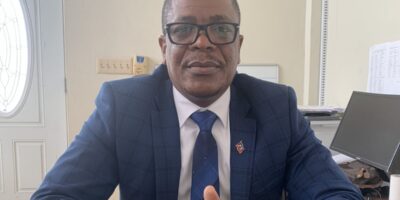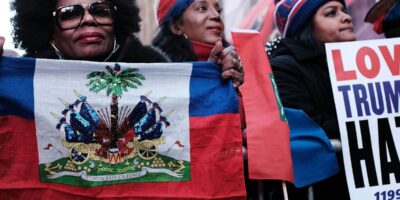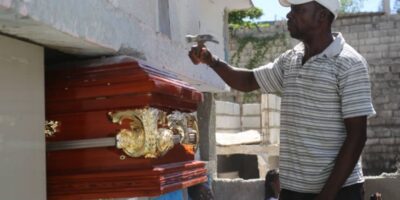The Haitian and Latino communities in Florida, who form a significant part of the state’s immigrant population, will bear the brunt of the new immigration law
In a crucial move that has garnered both applause and criticism, Governor Ron DeSantis of Florida has signed SB1817, a comprehensive immigration bill that is poised to have far-reaching consequences for the state’s Haitian and Latino communities. The legislation, aimed at tightening immigration policies, has intensified the ongoing debate surrounding immigration in the United States.
Signed into law on May 10, 2023, SB1817 encompasses a wide range of provisions that directly impact immigrant communities, particularly those of Haitian and Latino descent, who contribute significantly to Florida’s diverse population. The bill introduces measures aimed at enforcing stricter immigration policies, modifying legal protections, and enhancing cooperation between local and federal law enforcement agencies.
In a statement published the same day by his office, Governor DeSantis indicated he signed the bill to combat what he called the dangerous effects of illegal immigration caused by the federal government’s reckless border policies.
One of the most contentious aspects of said bill is its reinforcement of immigration enforcement mechanisms. The legislation expands the authority of state and local law enforcement officers to question the immigration status of individuals during routine interactions, such as traffic stops. Critics argue this provision could potentially lead to racial profiling, exacerbating existing tensions between immigrant communities and law enforcement agencies.
Additionally, SB1817 introduces changes to legal protections for immigrants residing in Florida. It limits access to state benefits and services, including healthcare and education, for undocumented immigrants. Moreover, the legislation penalizes local municipalities that adopt « sanctuary city » policies, which restrict cooperation with federal immigration authorities. Supporters of the bill maintain that these measures are necessary to ensure compliance with federal immigration laws and prioritize the interests of American citizens.
The Haitian and Latino communities in Florida, who form a significant part of the state’s immigrant population, will bear the brunt of the new immigration law. Stricter enforcement measures may disproportionately affect individuals from these communities, leading to increased anxiety and fear of deportation. The restrictions on access to essential services, including healthcare and education, could have a long-lasting impact on the well-being and integration of Haitian and Latino residents.
Impact on Haitian and Latino Communities
Florida is home to significant Haitian and Latino communities, and the implications of this immigration bill are particularly relevant for these groups. The tightened enforcement measures may disproportionately affect individuals from these communities, leading to heightened anxiety and fear of deportation. Furthermore, restrictions on access to essential services may have far-reaching consequences, potentially impacting the overall well-being and social integration of Haitian and Latino residents.
Advocacy groups, civil rights organizations, and some lawmakers have expressed concerns over the potential discriminatory effects of the legislation. They argue that it may perpetuate systemic inequalities and further marginalize vulnerable communities.
On May 11, several community, faith, immigration lawyers, advocacy groups, civil rights organizations, and business leaders from the Haitian-American community held a press conference in North Miami alongside the Family Action Network Movement (FANM) to strongly denounce the controversial bill. According to them, this law will negatively impact undocumented immigrants trying to regularize their immigration status, while seeking employment or health care, practicing law, and accessing proper identification and driving privileges. The bill will also expose U.S. citizens transporting them across state lines to felony charges, fines and jail time.
In an interview for AyiboPost, Marleine Bastien, FANM’s Executive Director, highlighted the importance of immigrants in Florida and its economy, and the far-reaching implications of the bill: “Whether it is on the issues of securing employment, seeking health care, practicing law, transporting loved ones across state lines, accessing proper identification and driving privileges, or requiring DNA samples from our incarcerated community members seeking to regularize their status, these bills have the same intent: deprive our immigrant communities and their networks of their dignity and humanity.”
North Miami Mayor Alix Desulme expressed his full support of FANM in terms of assisting immigrants. “This is cruel and inhumane, and we as a community will not stand for it”, he said.
Ira Kurzban, author of the Immigration Law Sourcebook, and a founding partner in the law firm of Kurzban Kurzban Tetzeli & Pratt, P.A., of Miami, Florida, also noted: “We don’t have enough health workers in this state. About 30% of healthcare workers nationally are immigrants. We, in Florida, rank 41st on healthcare in the nation, and we rank in the bottom 10 % for child care & health care for children”.
For him, despite the fact that Florida does not have enough farm workers to pick the crops in the state, the governor and this state legislature have decided to address these issues in the following ways: firstly, if you drive in this state with a driver’s license from another state, the police can stop you.
“The question is: how will they figure out who is here lawfully and who isn’t? Secondly: business owners (with at least 25 employees) now have to comply with an I-9 form (which is a federal form) or be fined $1,000 dollars a day per worker for not complying with the E-Verify program’s requirements”, he says.
Leonie Hermantin, Haitian activist and Director, Development, Communications, Strategic Planning at Sant La adds: « A year ago, a woman came to Sant La to give birth, because she was afraid to go to the hospital. A few months later, a woman carrying triplets lost two of them, because she was afraid to go to the hospital. To all those in whose name the governor has enacted this bill, to all those who claim to be “pro-life,” just understand what the ramifications of this law will be.”
To Hermantin this will mean the deaths of children, unborn children & born children, because parents and members of the community will be forced to consider who is documented or who is not when there is a medical emergency in the family. “Both of these women have the legal right to seek medical care, but they chose not to because they were afraid, due to this atmosphere of fear…. Understand that American citizens will be harmed because they fear, and that is un-Christian, un-democratic, and that is not RIGHT », she says.
Stephanie Walls, Director of Operations at the Florida Immigrant Coalition (FLIC), affirms that this bill is still terrible and that what it symbolizes is awful. “The governor is using us, and manipulating us. They are attacking our families, our homes and our health for political gain. These bullies think they are up against someone more vulnerable, to be used to their advantage. We are here to show them that that is so incredibly manipulative and un-American. We are here to surprise them, because our community is strong. We are Haitian strong, Cuban strong, Columbian strong and we are immigrant strong”, she argues.
In an interview with Ayibopost, Tessa Petit, the Executive Director of Florida Immigrant Coalition (FLIC), indicated that advocacy groups and civil rights organizations are working hard to make the new law less catastrophic for immigrants.
“When the law was submitted on March 7, 2023 it was very scary: mostly with the part saying you can go to jail if you shelter someone at home. So the mobilization makes the Republican legislators back down”, she explained.
Petit notes that the law no longer requires all private employers to use E-Verify – a federal database system that allows enrolled employers to confirm their employees’ eligibility to work in the United States. Now, the law requires public employers and private employers with 25 or more employees to use the E-Verify employment eligibility verification system.
She admits the Haitian community is not well aware of the implications of the law due to a lack of access to information. To tackle that, she announced that FLIC would organize a townhall in collaboration with Representative Doty Joseph to help Haitians understand the implications of the law and how they can protect themselves.
“It is very cultural. We come from a country where we were told not to be involved in politics. We don’t come here together, we don’t come here for the same reason. We don’t get used to practicing advocacy contrary to the Latino community, whose members are well-organized.
Read also : The growing influence of Haitian-Americans on the American political landscape
Petit acknowledges that the new immigration law creates fear in the Haitian community. “We can confirm that many people have left Florida. Many have been to Alabama. Many have been to farm areas like Jacksonville and Apopca. Many Haitians are already subject to the racial profiling”.
According to Petit, there are about 800,000 undocumented immigrants in Florida. But, the law does not only affect new undocumented immigrants. It also affects Deferred Action for Childhood Arrivals (DACA), an administrative relief that protects eligible immigrants who came to the United States when they were children from deportation.
“Even if the children have a status, their parents do not have a status. This law brings division in the family”, she says. Adding that the way the law is written did not specify what statute it is aimed at. “Those who support the law say it is against people who do not have a work permit. I can have legal status without a work permit. We are working with the Southern Poverty Law Center (SPLC) and the American Civil Liberties Union (ACLU) to see what we can bring as litigation and lawsuits against this law.”
Petit recommends people to learn about their rights, and to look for information on how they should protect themselves. “Know your constitutional rights. You are not required to answer police questions about your immigration status if you are not committing any offenses”.
She also shares that there are groups across the state of Florida that will organize boycotts and protests between June 28 and July 1, 2023 with farmworkers. The workers will rally with employers. “I remind Haitians that we must learn to mobilize. We are also in this situation by the way we voted.”
A 35-year-old undocumented member of the Haitian community who granted AyiboPost an interview expressed her concerns about the bill. “This hurts us to learn how this new law will treat us, not being able to readily and freely access medical care or work. Immigrants are doing the work that cannot be done without them, yet we are badly treated, and even more so when this bill takes effect. We did not defeat slavery in Haiti so that we could be mistreated here”, she says.
For her part, Eline Dimanche, 35 and mother of two, says this law gives them a lot to think about in the community. “We have arrived here, and we do not have stability yet. This law makes us lose hope. We hope God will help us. I think these people want to destroy the state of Florida. We are here to work, to seek a better life. I don’t see the meaning of that.”
She underlines she is not scared. But this frustrates her a lot. She did not see herself leaving Florida, because these laws were passed and adopted, but according to her will. “I am indecisive. I want to leave, I don’t want to leave. Finding housing becomes complicated, especially when you have children and are undocumented. As an immigrant, it saddens me, because if Haiti did not have a problem of political instability and insecurity, we would not be in this situation.”
Immigration Attorney from the Jean LawGroup, Ruth Jean, who answered AyiboPost’s questions about this controversial law, explained the impact of the law on the Haitian-American community.
“I think it is important that our communities know that the law can impact anyone, US Citizens, Green Card holders, TPS, and undocumented people. The reason for this is that it criminalizes and penalizes behavior that anyone, with or without a status may take. It penalizes employers, citizens who may act in the interest of their undocumented family members, and whole communities by not allowing Counties funding to participate in community ID programs”, she says.
For Attorney Jean, the State of Florida should not be involved in the business of regulating immigration law and the passing of this bill is politics at its worst. She adds that it is important for the public to know the following regarding the law:
- Living with someone undocumented is not a violation of this bill.
- A person does not have to answer any questions regarding their immigration status when they go to the doctor or hospital.
- A person who is simply riding in a car with someone undocumented is not in violation of this bill, unless they are entering Florida from another state with the undocumented individual. If that is the case, they could be punished under the law as a felony and subject to 15 years in prison.
“I am certain there will be lawsuits challenging the constitutionality of the bill once it takes effect. In the meantime, the ways individuals can protect themselves are not to answer questions regarding their immigration status, whether it be to a hospital or law enforcement. Family members and community members who have the right to vote should consider these outrageous bills when it comes to election time. The community must stand up by voting out those individuals who obviously do not represent the best interest of Floridians”, she says.
Attorney Jean notes that the Haitian community will be especially affected because of the level of bias against people of color, which will result in the law being disproportionately enforced against Black and Brown immigrants. “It’s the nature of any policing/enforcement in the United States. People of color are treated as violators, while their white counterparts, who may be in the same situation, may not be impacted as greatly. This is why we as Haitians and immigrants of color must remain vigilant and cohesive as a community.”
Community, faith, immigration lawyers, and business leaders from the Haitian-American community believe the bill will exacerbate existing disparities in the criminal justice system, as immigrants and people of color often face harsher treatment and longer sentences than their white counterparts.
Despite all of the protests across Florida, SB1817 took effect on July 1, 2023. Its implications for Haitian and Latino communities, as well as the wider immigration debate, will be closely monitored both within Florida and across the nation. As many immigrants leave Florida, a shortage of employees was reported in the construction and agriculture sectors. A few Republican lawmakers who voted for the bill have asked people not to leave the state, admitting outright that the bill was just a scare tactic. The impact of this legislation on marginalized communities and the ongoing discourse surrounding immigration policy will undoubtedly shape the future of immigration discussions in the United States.
What to know about this controversial legislation:
- Prohibits counties and municipalities, respectively, from providing funds to any person, entity, or organization to issue identification documents to an individual who does not provide proof of lawful presence in the United States;
- Specifies that certain driving licenses and permits issued by other states exclusively to unauthorized immigrants are not valid in this state;
- Requires any hospital that accepts Medicaid to include a question on its admission or registration forms about whether the patient is a United States citizen, is lawfully present in the United States, or is not lawfully present in the United States;
- Requires each hospital to provide a quarterly report to the Agency of HealthCare Administration, detailing the number of visits or admissions by patients who responded to the above question in each category;
- Requires hospitals to collect and report healthcare costs for illegal aliens;
- Requires private employers with 25 or more employees to use the E-Verify system for new employees. It fines employers who fail to use E-Verify $1,000 per day;
- Prohibits undocumented law school graduates from being admitted to the Florida bar;
- Enhances penalties for human smuggling, including making knowingly transporting five or more illegal aliens or a single illegal alien minor a second-degree felony, subject to a $10,000 fine and up to 15 years in prison;
- Provides $12 million to continue the Unauthorized Alien Transport Program to relocate illegal immigrants to sanctuary jurisdictions.
Jolette Joseph is also an employee of FAMN (Family Action Network Movement).
Cover image : Governor Ron DeSantis of Florida | © AP/John Raoux
Gardez contact avec AyiboPost via :
▶ Notre canal Telegram : cliquez ici
▶ Notre Communauté WhatsApp : cliquez ici







Comments